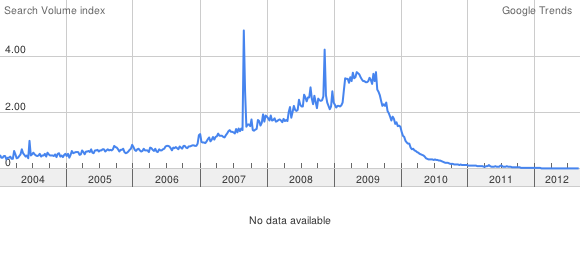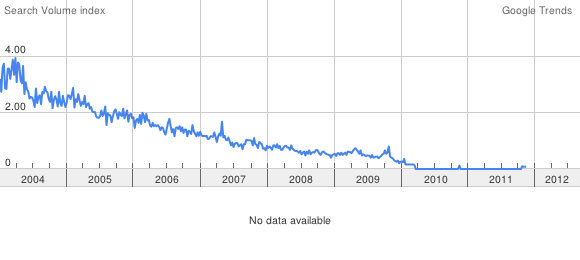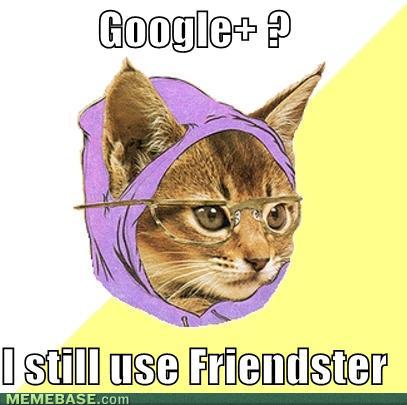Friendster, Myspace, Bebo. They were huge not long ago. Do social networking sites tend do die faster than other types? My guess is that they do, for two main reasons:
1) Metcalfe’s law. A social network increases its value faster than linearly as the number of users grow. Obviously it goes both ways. This is different from a content site: the content in Geocities or Tripod continued to be useful to individuals for a long time after authors stopped updating it.
2) “Coolness” factor. If your cool friends stop using Friendster or Myspace, you don’t want to use them either. It’s ok to lurk, but not to be seen doing anything. On the other hand, your Google searches may take you to content sites that nobody updates anymore. You can visit a Tripod page. No one needs to know.
Compare the rise and fall of Friendster with the slow decay of Geocities during the same time frame:
Friendster
Geocities
Of course these two charts are far from scientific evidence. I spent an hour looking at traffic data (not just search trends) for a number of social networking sites. They all show the same quick decay when compared to content sites. You could argue that all these sites were killed off by the meteoric rise of Facebook, but that’s partially the point. If these sites had interesting content that was publicly accessible, we’d still be seeing residual traffic like we did with Geocities. Even today, Tripod’s Alexa ranking is 926 (compare with Friendster at 15k or Bebo at 4k.
What could this mean for Twitter and Facebook? For starters, Twitter’s content is ephemeral in nature. It doesn’t contain cultural artifacts with long-term value such as the lyrics to the Mr. Ed Theme. This means that if users stop tweeting, traffic will likely implode. Also, the barrier to exit Twitter is very low. Most of us don’t have that many followers, and we could easily “tweet” on Facebook, LinkedIn, app.net, etc. If Twitter disappeared tomorrow (or if I got kicked out), the three or four people who care could find me easily 🙂 What makes Twitter really valuable are the tiny fraction of people who have amassed a large audience. These people are more invested, and they tweet more often. If they became alienated and went elsewhere, so would their followers.
The story is a bit different for Facebook. It’s harder to leave because your friends and family are there. You could replace many of the people you follow on Twitter by a different set, and still get most of the same value. However, your friends and family are unique. Four years ago Cory Doctorow argued that your creepy ex-coworkers would kill Facebook. Obviously that hasn’t happened yet (here’s a Hacker News discussion about what they have been doing to prevent it). The main risk to Facebook is that it will become “uncool” like Friendster and Myspace before it. So far Facebook has managed to avoid that fate.
The main point of this post is that there are two kinds of companies: those that could erode and lose market share quickly over time, and those that are more prone to a quick collapse. Social networking sites seem to be most unstable company type the world has seen.
TL;DR: Big social networks need to take advantage of the spotlight, and solidify their position to rely less on network effects. Otherwise, they are extremely risky investments.



That was a really interesting read. Awesome post.
I’m glad I found this on HN – a great read to close out a great week!!
The social network death spiral is always interesting to watch. I’ve been part of a few social networks while they have been imploding and the spiral always seems to look the same way. It seems to usually start when some high profile/influential users defect from the network. Not only does this kill off some content (and reduce the value of the network), but it injects social pressure to leave the network.
That social pressure leads more users to leave. As they leave, there is less content on the network. When there is less new content, the DAU count starts to drop. After all, why log into $network every day if you only get five updates a week? When people stop using a network daily, they break the habit. And as habits die, the DAU begins to spiral down and the network dies a fast and ugly death.